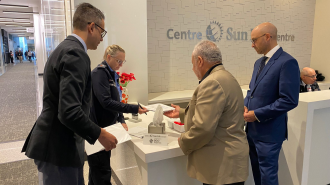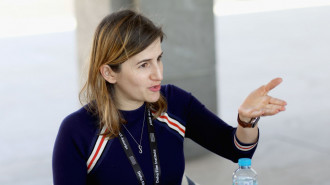
From crushed Olympic dreams to obstacles in their freedom of mobility: The ongoing plight for Afghan women refugees

The Paris 2024 Olympic Games was a historical triumph for refugee representation, with 37 athletes from 15 host nations competing: an all-time record since the World Refugee Team’s inception.
But it’s a statistic that belies an unfortunate truth: many eligible refugees were denied the chance to qualify due to the bureaucratic complexity of international sporting competition.
Fatima Ahmadi, Khadija Rezaie and Faeza Rezaei, all refugee athletes based at the World Taekwondo Centre (WTC) in Victoria, Australia, were registered to compete at the Oceania Olympic Qualifier in Honiara, Solomon Islands on April 6, with high hopes of joining the World Refugee Team in Paris.
Three days before the event, the WTC posted a photo of the athletes on their Facebook page, wishing the women and their teammates “good luck” as they waited to board their outbound flight.
But the WTC contingent never made it to Honiara and the team has not publicly commented since.
The New Arab can reveal that the group was instead turned away at Brisbane Airport, with confusion over their citizenship and residency status resulting in airport officials denying them boarding.
“There were at least three … refugee athletes in the female under 49kg class that travelled from Melbourne to Brisbane and then attempted to board a flight to the Solomon Islands,” confirmed John Kotsifas, President of the Oceania Taekwondo Union.
“Unfortunately, the athletes were not permitted to board the flight from Brisbane to the Solomon Islands where the event was being held because as refugees, they required a visa and visas had not been issued to them.
“I understand that applications were made for them to be granted a visitor visa, but the applications were refused.”
The Solomon Islands Ministry of Commerce, Industry, Labour and Immigration could not be reached for comment on the matter, while an Australian Government body told The New Arab that “it is not appropriate for the Australian Government to comment on the entry requirements/decisions of other sovereign states.”
Missed chances for showcasing female talent
Ahmadi, Rezaie and Rezaei missed their chance at Olympic glory, but it is certainly not the first nor the hardest adversity they have endured together.
The trio escaped to Australia together, part of a group of seven female athletes evacuated from Afghanistan to Melbourne in September 2021, necessitated by the fact that, as reiterated by UN Special Rapporteur Richard Bennett and colleagues in August, the Taliban routinely uses women’s participation in sport as a “pretext to violate human rights”.
Beyond the personal tragedy, the trio's absence from international competition continues a trend of compounding invisibility experienced by Afghan women.
Domestically, the Taliban’s new vice and virtue law has ratified the requirement that women must fully cover their faces and bodies in public.
But, perhaps more surprisingly, the recent barring of the Australian refugee contingent demonstrates that Afghan women’s freedom of mobility — and likewise their right to equitable cultural participation — does not suddenly materialise, even after being granted refuge in Western states.
Citizenship challenges
Dr Graham Thom, Advocacy Coordinator at the Refugee Council of Australia, shed light on why these barriers persist for Afghan refugees.
“In some respects, Australia has been very generous. We have a resettlement pathway… however, they’re now on the same pathway to citizenship as any other permanent resident."
This pathway to citizenship, Thom noted, is far more streamlined for those emigrating from developed nations, due to easier access to personal documentation.
“If you’re from Afghanistan, do you have a birth certificate? And what if you don’t have [one]?
“Can you go back to the Taliban and say ‘Hey, I need a birth certificate, I’m trying to become a citizen of Australia, [because] I fled as a refugee’? The actual processing for people from Afghanistan, even though, in theory, it should be the same… it’s often slower.
“It’s been a real feature for the Afghan community.”
Bureaucracy of athletic dreams
For women such as Ahmadi, Rezaie and Rezaei, Thom noted that these bureaucratic barriers severely impact freedom of mobility, often during vital moments in their burgeoning careers.
Whilst permanent residents in countries such as Australia enjoy similar domestic rights to citizens, barriers to global participation persist.
“In terms of travel, you don’t have a passport and when you don’t have a passport, that suddenly makes your life very, very difficult,” Thom said.
Temporary travel documents endorsed by the UNHCR are often issued to bridge this gap, Thom confirmed but, as exemplified by the trio’s experience, some states will perceive this document as “a red flag”.
“It’s a lottery,” Thom said.
“It depends on your host government; it depends on your sporting body; it depends on the country where you want to go and participate in any lead-up events.
“It’s totally beyond [the refugee’s] control and it only ever changes when they become a citizen of their host country.”
For refugees from countries such as Afghanistan, Thom says it’s not uncommon to be waiting up to 10 years for full citizenship.
“By the time 10 years is up… you’re no longer an elite athlete. That time is gone. You only have two shots in an Olympics or maybe only one shot… and if you miss that, that’s it. You’ll never get another chance.”
Thom emphasised that this is an ongoing issue affecting all refugees, regardless of their specific career aspirations.
“People like us from Australia take for granted that if we want to travel anywhere in the world, we just book a ticket… but when you’re a refugee, doors shut in your face, regardless of whether you’re an elite athlete or not.”
'Truly heartbreaking'
Ahmad Roman Abasy, a Sydney-based Afghan Taekwondo star and human rights advocate, who also narrowly escaped capture from the Taliban, said he sympathises with the setbacks faced by Ahmadi, Rezaie and Rezaei.
“These athletes have already faced so much, and losing their Olympic dreams like this is truly heartbreaking,” he said.
“[Relocating] takes a lot of courage and strength… [and] this reminds us of the extra challenges that refugee athletes often face, even after reaching a safer country.”
Although the Paris 2024 Paralympics saw the triumph of Afghan Taekwondo athlete Zakia Khudadadi, who earned an inaugural bronze medal for the refugee team, Abasy emphasised the importance of all Afghan women having an equal opportunity to compete in future.
“Seeing [more] Afghan athletes, especially women, compete on the world stage would have sent a strong message,” he said.
“It would have shown that, despite the Taliban’s attempts to silence and oppress women, they are still fighting for their place in the world.
“It’s a message of resilience and hope that the world needs to see.”
Bianca Roberts is a freelance journalist and mass communication lecturer in Abu Dhabi, United Arab Emirates
Ciaran O'Mahony is an Abu Dhabi-based journalist whose work has been published by numerous outlets including The Guardian and The Age. He is the founding editor of the independent and award-winning publication, The Jaded Newsman







 Follow the Middle East's top stories in English at The New Arab on Google News
Follow the Middle East's top stories in English at The New Arab on Google News


